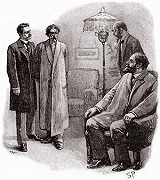“For nearly two hours we drove without my having the least clue as to where we were going. Sometimes the rattle of the stones told of a paved causeway, and at others our smooth, silent course suggested asphalt; but, save by this variation in sound, there was nothing at all which could in the remotest way help me to form a guess as to where we were. The paper over each window was impenetrable to light, and a blue curtain was drawn across the glasswork in front. It was a quarter-past seven when we left Pall Mall, and my watch showed me that it was ten minutes to nine when we at last came to a standstill. My companion let down the window, and I caught a glimpse of a low, arched doorway with a lamp burning above it. As I was hurried from the carriage it swung open, and I found myself inside the house, with a vague impression of a lawn and trees on each side of me as I entered. Whether these were private grounds, however, or bona-fide country was more than I could possibly venture to say.
“There was a coloured gas-lamp inside which was turned so low that I could see little save that the hall was of some size and hung with pictures. In the dim light I could make out that the person who had opened the door was a small, mean-looking, middle-aged man with rounded shoulders. As he turned towards us the glint of the light showed me that he was wearing glasses.
“ ‘Is this Mr. Melas, Harold?’ said he.
“ ‘Yes.’
“ ‘Well done, well done! No ill-will, Mr. Melas, I hope, but we could not get on without you. If you deal fair with us you’ll not regret it, but if you try any tricks, God help you!’ He spoke in a nervous, jerky fashion, and with little giggling laughs in between, but somehow he impressed me with fear more than the other.
“ ‘What do you want with me?’ I asked.
“ ‘Only to ask a few questions of a Greek gentleman who is visiting us, and to let us have the answers. But say no more than you are told to say, or-’ here came the nervous giggle again- ‘you had better never have been born.’
“As he spoke he opened a door and showed the way into a room which appeared to be very richly furnished, but again the only light was afforded by a single lamp half-turned down. The chamber was certainly large, and the way in which my feet sank into the carpet as I stepped across it told me of its richness. I caught glimpses of velvet chairs, a high white marble mantelpiece, and what seemed to be a suit of Japanese armour at one side of it. There was a chair just under the lamp, and the elderly man motioned that I should sit in it. The younger had left us, but he suddenly returned through another door, leading with him a gentleman clad in some sort of loose dressing-gown who moved slowly towards us. As he came into the circle of dim light which enabled me to see him more clearly I was thrilled with horror at his appearance. He was deadly pale and terribly emaciated, with the protruding, brilliant eyes of a man whose spirit was greater than his strength. But what shocked me more than any signs of physical weakness was that his face was grotesquely criss-crossed with sticking-plaster, and that one large pad of it was fastened over his mouth.

“ ‘Have you the slate, Harold?’ cried the older man, as this strange being fell rather than sat down into a chair. ‘Are his hands loose? Now, then, give him the pencil. You are to ask the questions, Mr. Melas, and he will write the answers. Ask him first of all whether he is prepared to sign the papers?”
“The man’s eyes flashed fire.
“ ‘Never!’ he wrote in Greek upon the slate.
“ ‘On no conditions?’ I asked at the bidding of our tyrant.
“ ‘Only if I see her married in my presence by a Greek priest whom I know.’
“The man giggled in his venomous way.